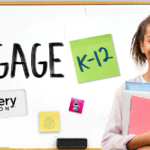Originally published in the January/February 2020 issue of AC&E/Equity & Access
Multiple studies in more than 22 states show that access to school libraries with a full-time, certified school librarian improves student achievement, regardless of the socio-economic or educational levels of the community. (Library Research Service 2018).
In fact, a 2012 study in Pennsylvania showed that at-risk students benefit more than not at-risk students from the presence of a full-time certified school librarian. This study found that students who are economically disadvantaged, black, Hispanic, or have IEPs (i.e., students with disabilities) had proportionally higher reading and writing achievement scores on state testing when they had access to a school library staffed by a certified school librarian.
Specific results include:
- Generally, the benefits (higher reading and writing scores) associated with larger school library staffing and collections and increased access to technology, databases, and the library are proportionally greater for students who are poor, black, Hispanic, or disabled.
- A higher percentage of students who are poor, minority, or have IEPs who have full-time librarians scored “advanced” on state reading tests.
- Students who are poor, minority, or have IEPs, and who have full-time school librarians, are at least twice as likely to have “Advanced” writing scores as their counterparts without full-time school librarians. (Kachel and Lance 2013)
With these findings, we would expect to find more schools trying to provide their students with equitable access to school librarians. Right? In fact, the opposite is the case. The data from the National Center for Education Statistics (NCES) shows that between the 1999–2000 and 2015–2016 school years, the number of school librarians dropped by 20 percent nationwide. In addition, this data shows that some states had a much higher percentage of losses to school librarian positions than others. For instance, Idaho lost 65 percent of its school librarians during that time frame, Michigan lost 53 percent, and Oregon 49 percent (Lance 2013).
Today’s school librarians provide services that are needed by all students.
School librarians are champions for equitable access to diverse resources in all formats including technology. Typically, the school librarians is the only person in a school with formal training in collection development, skillfully curating collections to meet the needs of a school’s curriculum and providing students’ self-directed learning opportunities. School librarians believe strongly in the benefits of a diverse collection. A diverse collection enables students to see themselves and people different from them in literature, building empathy and respect for others. This need for learners to experience “windows, mirrors, and sliding glass doors” was first identified by Dr. Rudine Sims Bishop (Potter 2019). School librarians are also strong defenders of intellectual freedom and the right for all students to have access to information and ideas and to speak and write freely.
School librarians are skilled at inquiry learning and strive to teach students to be critical thinkers.
They often have makerspaces in their libraries or integrate maker learning into their lessons (Maughan 2019). They encourage and teach students to be creators of ideas and products to demonstrate their learning and thinking. School librarians strive to teach students skills for college and career and to become lifelong learners. School librarians collaborate with content-area teachers to promote literacy and reading; teach media/information literacy and digital citizenship skills to students; and integrate technology in meaningful and effective ways (Johnson 2019). School librarians often provide professional development to teachers on resources and technology that can be used in their instruction with their students.
School librarians are teachers and leaders who are at the heart of an effective school library. They provide a wide array of services to both staff and students in their schools.
In recent teacher strikes in both Los Angeles (Nadworny 2019) and Chicago (Yorio 2019), teachers were not necessarily striking for more teacher pay, but, were advocating for better services for their students. In both strikes, teachers were asking for all students in their districts to have access to certified school librarians.
When speaking to stakeholders about the role of the school librarian, leaders of the Michigan Association for Media in Education, Michigan’s professional association for school librarians, has found it is often necessary to summarize the contributions of the school librarians into a short list that connects to current educational concerns in their state. Leaders often speak with stakeholders using the following three talking points while providing a document that summarizes some of the research related to the impact of school librarians
School librarians:
-
- Increase student achievement
- Increase college and career readiness by teaching research skills and digital citizenship skills
- Lead technology integration (Michigan Association for Media in Education 2017)
Schools with a well-stocked and consistently funded library that is staffed by certified school librarians should be a reality for every child in the United States, not a luxury reserved for a privileged few. As a society, we prioritize what we value, and when we prioritize school libraries, we are saying that we value literacy and we value our students.
Policy makers and education advocates must recommend that all schools provide equitable access to effective school libraries staffed by certified school librarians for all students as they advocate for improving education.
The American Consortium for Equity in Education, publisher of the "Equity & Access" journal, celebrates and connects the educators, associations, community partners and industry leaders who are working to solve problems and create a more equitable environment for historically underserved pre K-12 students throughout the United States.
- American Consortium for Equity in Educationhttps://ace-ed.org/author/admin/
- American Consortium for Equity in Educationhttps://ace-ed.org/author/admin/April 23, 2025
- American Consortium for Equity in Educationhttps://ace-ed.org/author/admin/
- American Consortium for Equity in Educationhttps://ace-ed.org/author/admin/







